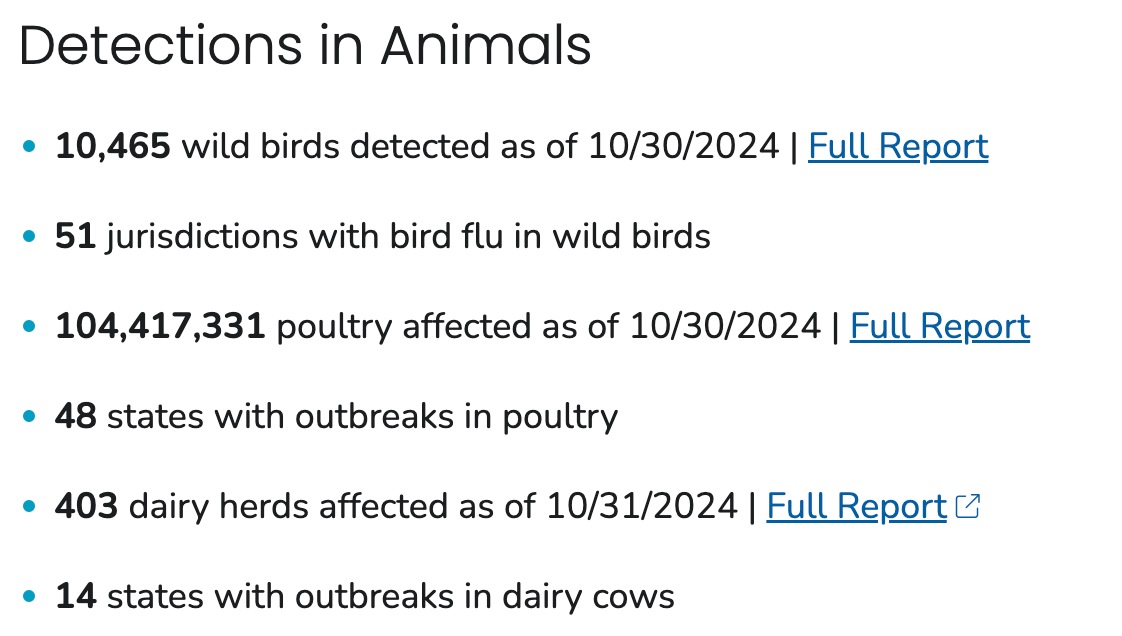Food News: Vegan Weapons of Mass Destruction
The newsletter that knows that photosynthesis is like so outdated.
hi hi,
i say this often but genuinely mean it each time—thank you for spending a few minutes reading my silly goose thoughts on food news, considering everything that is going on in the world at this moment.
wishing you a happy (or at the very least, not entirely crappy) halloween/diwali/world vegan day/shabbat/pre-election weekend.
see you on the other side.
-k
What I’ve Read
The FBI’s Weapons of Mass Destruction Program has a New Target: Animal Rights Activists - “The FBI has been collaborating with the meat industry to gather information on animal rights activism…under its directive to counter weapons of mass destruction…” according to records of FBI memos and other materials. This article shares a specific incident from 2019 of activists with Meat the Victims on a poultry farm in Texas being charged with criminal trespassing. It seems the chicken producer went directly to the local FBI Weapons of Mass Destruction coordinator to exchange info.
About 9 years ago, when I did my first food-focused research projects in college, I formulated a hypothesis that the FBI was largely responsible for negative connotations about vegans entering mainstream collective awareness. I think it stems from the FBI’s eco-terrorism campaign against animal rights activists in the 90s and early 2000s. AgGag laws evolved alongside this campaign. All of this set the stage for the criminalization of animal rights activism at state and federal levels and demonstrates the continued mutually beneficial relationship between government agencies and the animal agriculture industry.
With 'electro-agriculture,' plants can produce food in the dark and with 94% less land, bioengineers say - Genuinely LOLd at this introduction, “Photosynthesis, the chemical reaction that enables almost all life on Earth, is extremely inefficient at capturing energy”. Advancements in bioengineering allow scientists to replace natural photosynthesis with “electro-agriculture” which apparently converts CO2 into acetate, an organic molecule that plants could be genetically engineered to consume. Bypassing natural photosynthesis could allow us to grow food in space and reduce the environmental footprint of food production. Currently, scientists are focused on applying this research to tomatoes but the plan is to move onto high-calorie staple crops.
Fun science tidbit I learned from this article—germinating plants have a metabolic pathway that breaks down nutrients stored in their seeds but shuts off once the plants grow enough to use photosynthesis. Robert Jinkerson, a biological engineer and researcher working on this process, compares it to lactose intolerance in humans because once humans wean we typically lose our ability to digest lactose, previously our primary energy source. “Electro-agriculture” switches the pathway back on for adult plants.
Exclusive: State and industry input led US farm agency to relax bird flu testing order for cows - Speaking of our government being nice and cozy with the animal ag industry! In April, after bird flu cases were found in cows in 8 states, the USDA released an emergency order requiring milk-producing dairy cattle to have a negative bird flu test within a week before they were transported across state lines. Originally the USDA wanted the test limit to be within 3 days of travel, some veterinarians suggested 24 hours. The animal ag industry pushed back on that hard, citing logistics or cost and how testing and reporting don’t benefit dairy producers. There are written records showing industry executives pressuring state health officers and legislators to make exceptions or get rid of testing altogether.
Here’s some recent CDC data on bird flu:P.S. Bird flu has recently been detected in a pig in a “backyard farm in Oregon,” which could be more dangerous for the potential spread to humans, especially if pigs on factory farms become infected. Pigs have a unique ability to be co-infected with bird and human viruses and can cause genetic mutations to viruses that can infect humans. Those of us who had swine flu in 2009-10 know just how shitty that would be.
Trump says he’ll let RFK Jr. ‘go wild’ on health and food in potential second term - At his Madison Square Garden rally Trump said, “‘I’m going to let him go wild on health. I’m going to let him go wild on the food. I’m going to let him go wild on the medicines,’” along with a lot of other garbage. If Trump wins next week and follows through with his promises about putting RFK in a position where he can influence or control food and health regulations, we have so many reasons to be worried about our public health.
Scammers Stole More than 20 Tons of Cheddar Worth Nearly $400,000 From This Famed Shop in London - If you see an influx of premium Cheddar cheese on the black market it’s probably because someone fraudulently posed as a wholesale distributor for a French retailer and stole 950 wheels—or 22 tons—of cheese.
Greenwashing and denial won’t solve beef’s enormous climate problems - A cow beef-loving climate scientist gives a deep dive on beef’s climate impact and how the animal ag industry is winning the PR battle with—what I’m just going to summarize as—disinformation. Read this for thorough reporting on beef’s environmental challenges and how the industry has downplayed them, beef’s actual climate impact, the fallacies of Grass-fed and regenerative and other better-for-the-climate beef, and the research disproving some of the other quick fixes the industry is still trying to sell us on. Please note this is a purely environmentally-focused article and it does not attempt to touch the beef industry’s humanewashing or the animal welfare crisis.
Again With the Food Recalls?
Quick Summary
Food recalls can happen voluntarily, by request of a regulatory agency, or by order of a regulatory agency. These varying recall classes are based on the severity of the issue. Undeclared allergens are by far the most common reason for food recalls in the US—this goes for both USDA and FDA regulated foods.
Food recalls are a slow process due to the complex nature of our national and global food systems. It takes time for issues to be caught, raised to the company and regulatory agencies, investigated for the severity and spread, and then acted upon—which means coordinating between multiple regulatory agencies like the USDA, FDA, and CDC.
Once a recall is identified, retailers have to be notified to remove the affected or potentially affected products from shelves and this information has to also reach consumers. This is not a perfect system—and there are plenty of documented cases where companies have tried to disguise evidence of food safety issues and shirk blame—but it does work and is better than any process the US has had in the past.
In Why are there so many food recalls?, Adele Peters writing for Fast Company, shared the following sampling of recalls from the past 4 months:
Why It Matters
We have a relatively safe food system but it could be safer. While some food safety issues are inevitable others could absolutely be better mitigated—if not entirely prevented—by a more heavily regulated food system, streamlined regulatory and food safety processes, curbing corporate consolidation, and ending factory farming.
A safer food system would have to prioritize transparency, worker safety, animal welfare, and environmental protections. It would also have to allocate proper resources to regulatory and food safety agencies and not allow that progress to be rolled back by a president who favors corporate interests over the wellbeing of their country. We’re not even good at pretending like protecting people or our planet—nevermind the billions of animals funneled through our food system—is a priority.
On October 22nd the CDC began investigating an E. coli outbreak that was linked to the McDonald’s Quarter Pounder. Reports show 90 people have been infected in 13 states, 27 of them have been hospitalized and 1 person has died. It seems that onions from Taylor Farms are the cause of this E. coli outbreak. And I know where your mind is going so let me reassure you, the McDonald’s shareholders can rest easy about people’s health or lives interfering with their returns next quarter. At least, that’s what industry-focused media is reporting.
In Timing and Loyalty Mitigate Impact of McDonald’s Outbreak Vance Martin for The Food Institute wrote about how “tame” the reaction to the McDonald’s issue has been compared to Chipotle’s E. coli outbreak in 2015. Martin made sure to share that, “There’s been no organized outcry from consumers; CEO Chris Kempczinski’s job seems safe. On Tuesday’s third quarter conference call, executives in fact projected that the food safety issue would not have a material effect on the company’s results in the fourth quarter.”
Martin also cites luck as an additional contributing factor to the tameness of the public’s reaction to this particular outbreak. Apparently McDonald’s was lucky that E. coli hit so close to the election cycle. “No restaurant wants an outbreak of food-based illness, certainly. But should such an event occur, two weeks before an intensely-followed presidential election is the ideal time.”
I know we live in a late-stage capitalist hellscape but I also know we could do better than this.









